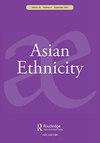Managing diversity: an assessment of the national question in Pakistan
IF 0.8
Q3 ETHNIC STUDIES
引用次数: 1
Abstract
ABSTRACT Modern societies are confronted with a plethora of issues that have far-reaching socio-political ramifications. The negative effects of diversity are primarily the result of state policies. Where societies were not homogenous, attempts were made to bring desperate populations together to advance official nationalist projects. Pakistan, being dominantly a Muslim state, has religio-cultural and ethnic diversity where minority groups have raised their voices against the unjust state’s policies. This study examines how these issues evolved over the course of Pakistan’s history. The paper attempts to answer the question ‘why has Pakistan’s plurality become unmanageable?’ The results demonstrate that a high degree of centralization of authority, the adoption of Urdu as a national language, a sense of domination of the central institutions by the Punjabis, underrepresentation of ethnic minorities in state institutions, and controlled society has aggravated the position of diverse groups in Pakistan, with colossal consequences to national economy and social harmony.管理多样性:对巴基斯坦国家问题的评估
现代社会面临着大量具有深远社会政治影响的问题。多样性的负面影响主要是国家政策的结果。在社会不同质的地方,人们试图将绝望的人口聚集在一起,以推进官方的民族主义项目。巴基斯坦是一个穆斯林占主导地位的国家,宗教文化和种族多样性,少数群体已经提出了反对不公正国家政策的声音。本研究考察了这些问题在巴基斯坦历史进程中是如何演变的。本文试图回答“为什么巴基斯坦的多元化变得难以管理?”“研究结果表明,权力的高度集中、乌尔都语作为国家语言的采用、旁遮普人对中央机构的统治感、国家机构中少数民族的代表性不足以及受控制的社会加剧了巴基斯坦不同群体的地位,对国家经济和社会和谐产生了巨大影响。”
本文章由计算机程序翻译,如有差异,请以英文原文为准。
求助全文
约1分钟内获得全文
求助全文
来源期刊

Asian Ethnicity
PHYSIOLOGY-
CiteScore
2.80
自引率
6.20%
发文量
27
期刊介绍:
In the twenty-first century ethnic issues have assumed importance in many parts of the world. Until recently, questions of Asian ethnicity and identity have been treated in a balkanized fashion, with anthropologists, economists, historians, political scientists, sociologists and others publishing their studies in single-discipline journals. Asian Ethnicity provides a cross-disciplinary, international venue for the publication of well-researched articles about ethnic groups and ethnic relations in the half of the world where questions of ethnicity now loom largest. Asian Ethnicity covers any time period, although the greatest focus is expected to be on the twentieth and twenty-first centuries.
 求助内容:
求助内容: 应助结果提醒方式:
应助结果提醒方式:


